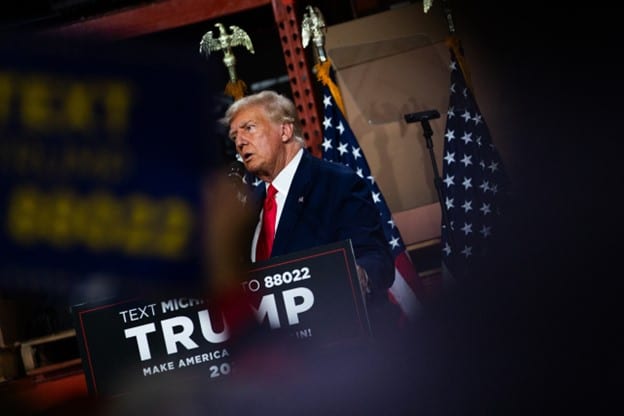In his infamous 2015 speech announcing he was running for president, Donald Trump spoke extensively about bringing manufacturing back to the U.S. and called out one company specifically: Ford. Now, eight years later, Trump is continuing his pitch to the working class by skipping the GOP primary debate to go to Michigan to “address” the autoworkers amidst the historic and ongoing UAW strike (though there is little evidence to suggest actual UAW workers were in attendance, and his speech took place at a non-union factory). This speech came just a day after President Biden made history by being the first sitting U.S. President to walk a picket line where he appeared with UAW President Shawn Fain and declared, again, his support for the striking workers, but without giving any concrete promises such as ensuring that the auto companies receiving millions in government subsidies don’t use that money to create more non-union plants.
In these two appearances, only a day apart, we can see the ongoing battle for the working class that is playing out between the two parties against the backdrop of the UAW strike. The process of dealignment — with the Democratic Party having lost significant support among the working class — opened up space for Trump to win in 2016 in large part because of support from sectors of the hundreds of thousands of workers who saw their living conditions plummet as a result of neoliberalism and who fell into poverty due to off-shoring and deindustrialization. This is particularly acute in the Midwest, which is a hub of the industrial working class who historically had supported the Democratic Party — creating the so-called “Blue Wall” of Democratic states in presidential elections. But now, these sectors are more “up for grabs.”
This makes the UAW struggle an existential battle for Trump and Biden, as whoever is able to come out stronger with the most support from the striking workers will be in a much better position to win Michigan, a must-win state for both candidates. This could be seen in Trump’s repeated calls for UAW workers to push their leaders to endorse him in his speech on Wednesday. Despite previously being critical of the union leadership, Trump insisted that “Your leadership should endorse me and I will not say a bad thing about them again.” This endorsement seems unlikely given that Fain has already called the speech at a non-union factory a “pathetic irony,” called Trump a servant of the “billionaire class,” and refused to meet with him — who, as president, did not address the 2019 UAW strike outside of a few vague tweets calling on General Motors and the UAW to “make a deal.” However, Trump does have a base within the UAW — exit polls in 2020 showed 40 percent of union members voted for Trump — and he is hoping to keep that base within his coalition as he prepares to face down Biden for the second time.
Trump’s speech focused on shifting the terrain of the discussion away from just the specific demands of the strike to the larger situation of auto production in the United States. Hitting electric vehicles (EVs) — a cornerstone of Biden’s new “green capitalist” approach — hard, Trump argued that “It doesn’t make a damn bit of difference what you get [in the strike] because in two years you’re all going to be out of business” because of the shift to EVs. This focus on EVs is the main ground on which both Trump and the Republican Party are hoping to gain on Biden — who, currently, is much better positioned to present himself as a friend of the strike and has done so in all his public statements on the struggle.
Biden’s massive handout to the auto companies to produce EVs didn’t come with any guarantees that new plants will be union, and conditions in current non-union EV manufacturers like Tesla are significantly worse than in union plants. Trump also highlighted that the massive shift to EVs would potentially destabilize the automakers and, in Trump’s framing, lead to more jobs being shipped overseas which would help China. In actuality, the Biden administration’s focus on EVs is part of his goal of strengthening the U.S. amidst the escalating competition with China. Biden is attempting to bring manufacturing back to the U.S. and is giving huge handouts to auto companies who will likely use that money to build non-union plants in the U.S. In this sense, we can see that both Biden and Trump are being driven by the competition with China and both, despite Trump’s claims, are trying to pursue economic nationalism.
It is these millions in subsidies granted by Biden and the Democratic administrations to capitalists like Elon Musk investing in EVs under grueling working conditions and the exceptional benefits granted by the Democrats to the Big Three that have pushed sectors of the working class into the orbit of Trumpism. Trump, after all, promises a break from the establishment and touted his proposal of “economic nationalism” as a solution for workers who have seen their lives worsen under neoliberalism. But, of course, a transition to green energy organized on the basis of profit and against the living conditions of the working class cannot be confronted with the anti-working-class policies of Donald Trump. Instead, it must be confronted with the independent organization and struggle of the workers.
Ironically, Trump also tried to make an environmental case against EVs — pointing to the environmental damage wrought by the mining of lithium — despite being a climate change denier whose record on the environment is abysmal. Importantly, the UAW strike has been supported by the environmental movement with 100 different organizations coming together to publish an open letter which declares that they “firmly support the UAW members’ demands and believe that the success of these negotiations is of critical importance for the rights and well-being of workers and to safeguard people and the environment…Only through meeting these demands will the United States ensure a just transition to a renewable energy future.”
Another point that Trump picked up on to attack Biden was Biden’s record as a proponent of neoliberalism. He pointed out that Biden made his career by supporting neoliberal attacks on workers and unions but is now posing for “photo ops” on picket lines. This sort of attack on the neoliberal establishment is what helped propel Trump to national prominence and his (false and broken) promises to reverse the neoliberal offensive on U.S. workers were a cornerstone of his 2016 campaign. In his speech on Wednesday, Trump touted a promise of “economic nationalism” which sought to pit the U.S. working class against our class siblings around the world — but most notably in China. This is the heart of Trump’s appeals to the workers: empty promises to reverse neoliberalism and a nationalistic message which seeks to isolate the U.S. worker from the international working class.
The fact that Trump has nothing to offer the working class should be obvious not only from his record as president (and as a business tycoon) but also from the mere fact that he gave his appeal to the working class at a non-union factory after being invited by an anti-union boss. Trump is a candidate of the bosses who is hoping to use the working class opportunistically to secure his election campaign in the midwest. He is attempting to split the working class along national, race, and gender lines to weaken the working class to allow for more attacks, not fewer. His appeals to the UAW workers are exactly what they look like: bare-faced attempts to secure support in a crucial swing state. But they are also part of a larger Republican project of trying to split the working class away from the Democratic Party in order to build up the GOP’s electoral base.
Using the working class in this way — as Biden is also trying to do — only underscores that neither the Republicans nor the Democrats have actual answers for the aspirations of the working class. We need to follow the example of the UAW workers and demand more: more than either party can ever give us, more than capitalism can ever give us. The UAW strike has already dramatically altered the electoral race and put the working class on the political scene as a central actor. The challenge is not only to ensure the strike triumphs but also that it remains independent of both major parties of capital, that it extends and deepens the active intervention of the rank and file in decision making and action with rank-and-file organizations organized by the union that can decide, discuss, and organize the defense and extension of the strike.
What is at stake is the political and organizational independence of the autoworkers and the working class as a whole that can trust neither Biden nor Trump. The Democratic and Republican parties do not represent us and, as Fain himself said, workers should not vote for millionaires or billionaires. So part of our task is to set up an independent working class party that, in our view, must embrace a socialist perspective that consistently fights against the bipartisan regime and its anti-working class institutions.











